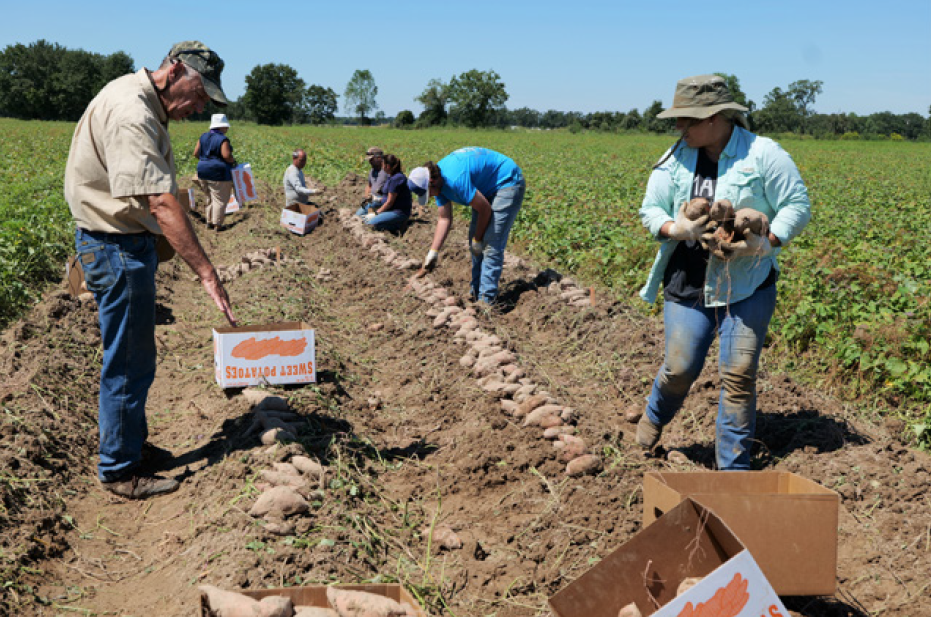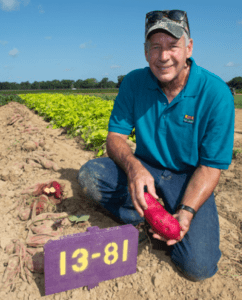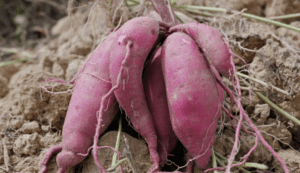

Sep 14, 2022LSU breeder LaBonte sets the sweet potato standard
With each new variety from the Louisiana State University (LSU) AgCenter sweet potato program, plant breeder Don LaBonte raises the bar for subsequent releases.
For an advanced line to be considered for commercialization, it must perform better in at least one category than existing varieties.
“There are such good varieties out there today, so it’s really got to be better,” he said. “You really have to slow down and ask, ‘Is there a problem with it?’ That’s where we are with 18-100. It takes testing again and again to make sure you aren’t missing something that might be a flaw.”
The advanced line known as LA 18-100 has light rose skin and deep orange flesh, resembling Orleans and Beauregard. In Mid-South field trials, it has produced higher yields of mostly No. 1s than Orleans, a widely grown LSU variety.


If LA 18-100 continues performing as it has, he said he may consider releasing it in 2023.
LSU has one of only two university sweet potato breeding programs in the U.S. (The other is at North Carolina State University.)
Without a local breeding program, growers in California – the nation’s second-leading sweet potato producer – rely on both universities’ efforts, said Scott Stoddard, a University of California Cooperative Extension vegetable crops farm advisor for Merced and Madera counties.
“If we didn’t have these guys, we’d just be stuck in a terrible situation,” he said.
To develop new varieties, LaBonte (top photo, tan shirt) uses traditional breeding techniques that involve crossbreeding lines with desirable traits and then rating the offspring. Of the thousands of crosses he makes every year, only about 300 move onto the next evaluation step.
Typically, LaBonte said it takes at least six years to develop a new variety.
A long wish list of traits
In addition to strong production of mostly No. 1s, LaBonte looks for yield stability, a consistent root shape, sweet flavor and resistance to a host of soil-borne pests and diseases. He also enlists LSU AgCenter entomologists, plant pathologists and nematologists to help screen lines.
Complicating varietal development is the two-step sweet potato production system. Sweet potatoes are propagated vegetatively using plant cuttings – known as slips – grown in plant beds. Once sprouts reach 10 to 12 inches tall, workers cut them to transplant into the field.
To be considered, an advanced line must perform well in both plant beds and the field.


LaBonte’s initial work is conducted at the AgCenter’s Sweet Potato Research Center in Chase, Louisiana. Advanced lines are then moved into on-farm field trials in south and north Louisiana, Arkansas, Mississippi, South Carolina and California.
“I think often what we find is a variety will have a fit some places and in other places, it just doesn’t work,” he said. “It’s really hard to find what I would call a universal variety.”
Stoddard agreed, saying some LSU varieties that don’t perform well in Mid-South trials do well in California and vice versa. As a result, he began conducting trials with advanced LSU materials several years ago to intercept lines that LaBonte would have pulled because of a poor Mid-South showing.
Larry Fontenot, who grows sweet potatoes near Ville Platte, Louisiana, has been hosting on-farm LSU variety trials for years. He said he considered it part of his responsibility as a grower to support research, particularly for a minor crop like sweet potatoes.
“If growers don’t assist the breeder, we’re not contributing to the future of the sweet potato industry,” Fontenot said. “I feel we’re obligated to our industry and to enhancing the future of the breeding program, and that breeding program has been the lifeblood of our industry.”
A showy ‘vermillion’ skin
The latest variety from the LSU program is Vermillion, trialed as LA 13-81. Limited amounts of certified seed were commercially available this season. Named for both its eye-catching purplish-red skin and a Louisiana parish, Vermillion has deep orange flesh and resembles Diane – a variety widely grown in California.
In trials in Arkansas, South Carolina, Louisiana and California, Vermillion had average yields of No. 1’s comparable to Orleans. But it produced about 10% lower No. 1 yields and 15% less total marketable yields than Diane in California trials.
Where Vermilion excelled was in long-term storage, Stoddard said.
“Four months into storage, and our pack-out was much better. So my take is Vermillion will be a nice complement to Diane,” he said. “You have an early season with Diane and a later selling season coming out of storage with Vermillion to fill that niche.”
The color purple
Since the early 2000s, LaBonte also has been working to develop an improved purple sweet potato variety, considered a holy grail of breeding.
“Actually, I thought it would be a lot easier,” he said. “The material we started out with had a pretty primitive background, so you had to breed in all of the desirable disease-resistance traits, shape, yield as well as flavor. Getting all of that in one package has really taken longer than I had expected.”
That said, LaBonte has a couple of advanced purple lines that are “quite attractive,” have a sweet flavor and a moister texture than some current varieties. Only time – and strong performance in additional variety trials – will tell whether they are commercialized.
– Vicky Boyd, contributing writer














